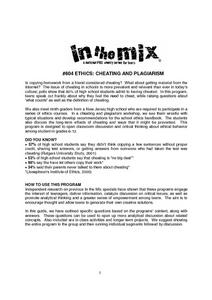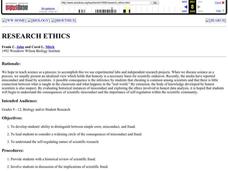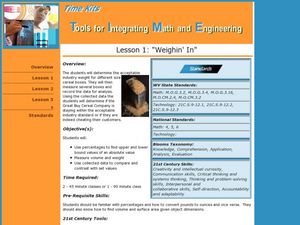101 Questions
Pokémon Go Cheat
Gotta catch them all—no learner left behind! Young scholars must predict the length of time it takes a phone attached to a fan to travel five kilometers given the radius and rotations versus time data. Why would you attach a phone to a...
Curated OER
Ethics: Cheating and Plagiarism
Students examine the reasons why students cheat and plagiarize material. They discuss what could have been done to avoid cheating and copying material. They answer questions to end the lesson.
Curated OER
Introduction to Watsonville Wetlands
Identify the different plants and animals found in wetlands, your class will explain the importance of wetland ecosystem and locate the different wetlands in their area.
Curated OER
Research Ethics
Young scientists discuss the results of carelessness during experimentation and the temptation to misrepresent findings. These activities are intended to develop the ability to identify scientific error, misconduct, and fraud. Use this...
Curated OER
Shrinky Dinks® Palettes
Here is a fun and clever lesson for teaching physics classes how to calculate wavelength if given the energy and frequency data. On a worksheet, they compute wavelengths using a table of information that you provide. On a paper palette,...
Curated OER
Spoonfuls, Cupfuls and Handfuls
Explore the use of non-standard units for measuring volume with elementary learners. They fill a container and count the number used using cups, spoons, and bottles, build with blocks and count the number of blocks used, and compare and...
Curated OER
ENTICEing Fun with Illinois Facts
Pupils participate in a multi-grade scavenger hunt. Using fun-fact cards, they answer questions based on Illinois. They record their answers in a journal and discuss any items they are unclear on.
Curated OER
Inertia Tricks
Students explore inertia using magic tricks. They participate in demonstrations using tablecloths and dishes, Ken and Barbie, and Wine Bottles.
Curated OER
Research Ethics
Students develop an ability to distinguish between simple error, misconduct and fraud. Students are lead to consider a widening circle of the consequences of misconduct and fraud. They expand their knowledge on the self-regulating...
Curated OER
Tools for Integrating Math and Engineering: Weighin' In
Students collect and analyze data on a fictional cereal company's products. In this measurement instructional activity, students collect data from cereal boxes (weight, volume, surface area, etc.) to determine if the boxes labels...
Curated OER
Rounding Decimals
Fourth graders explore rounding a price given in dollar and cents to the nearest dollar. In this math instructional activity, 4th graders discover how to round to the nearest dollar. Additionally, students practice rounding money for...
Curated OER
Predator-Prey Simulation
Students simulate the interactions between a predator population of lynx and a prey population of rabbits. They collect and graph the data, then extend the graph to predict the populations for several more generations.
Curated OER
Natural Selection
Pupils model natural selection by using various utensils to "capture food" using a simulated species called "Woolybooger's."
Curated OER
The Birds and the Bees, and the Flowers and the Trees
Students examine the roles in which animals play in the pollination of plants. They recognize that flowers have male and female sexes. Students describe cross pollination and propose reasons for cross pollination through narration of a...
Other popular searches
- Cheating in the Classroom
- Integrity Cheating
- Stealing and Cheating
- Cheating and Plagiarism
- Ethical Dilemmas Cheating
- Sportsmanship or Cheating
- Lying Cheating
- Academic Cheating
- No to Cheating
- Sports Cheating
- Cheating in Sports
- Sports, Cheating















